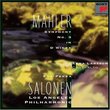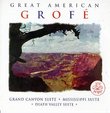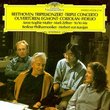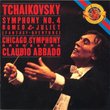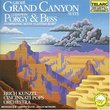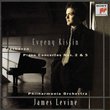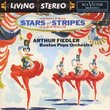| All Artists: Etienne-Nicolas Mehul, Michel Swierczewski, Lisbon Gulbenkian Foundation Orchestra Title: Mehul: Complete Symphonies Members Wishing: 0 Total Copies: 0 Label: Nimbus Records Release Date: 12/2/1992 Genre: Classical Styles: Opera & Classical Vocal, Symphonies Number of Discs: 2 SwapaCD Credits: 2 UPC: 710357518423 |
Search - Etienne-Nicolas Mehul, Michel Swierczewski, Lisbon Gulbenkian Foundation Orchestra :: Mehul: Complete Symphonies
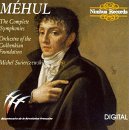 | Etienne-Nicolas Mehul, Michel Swierczewski, Lisbon Gulbenkian Foundation Orchestra Mehul: Complete Symphonies Genre: Classical
|
Larger Image |
CD DetailsSimilarly Requested CDs |
CD ReviewsLife before Berlioz Kicek&Brys | USA/UK | 02/26/2002 (5 out of 5 stars) "I never used to believe that there were any French symphonies worth hearing before Berlioz's revolutionary masterpiece "Symphonie Fantastique" (1830) but these excellent works by Etienne-Nicolas Mehul, from around twenty years earlier, proved me pleasantly wrong. Mehul was a big influence on Berlioz, of course, as anyone who has heard his opera, "Stratonice" (recorded by William Christie on Erato) can attest, but these Classical symphonies have more in common with Haydn and the early Beethoven. In fact, the minuet of Mehul's First Symphony, with its pizzicato strings, bears a striking resemblance to the third movement of Beethoven's Fifth; which composer influenced the other, or if indeed it was just a coincidence, has never been decided. In any case, Mehul has a voice of his own, and these works are both melodious and moving, particularly in the melancholy, contemplative slow movements. The most common adjective used to describe Mehul's music is `noble', and I wouldn't disagree, but there are also moments of sparkling joyfulness. Perhaps the most immediately appealing work here is the Second Symphony but as David Charlton (who rediscovered the score) writes in his notes, the Fourth is the most visionary, both in the way it brings back the theme from the Andante in the final movement, and in Mehul's extraordinary orchestration in the third, where he strips the orchestra down to just the cellos for a long, arching melody of austere beauty. The performances, by Michel Swierczewski and the Gulbenkian Foundation, are very good, although the recording (as so often with Nimbus) is slightly too echoey and some detail is lost. It's interesting to contrast them with Marc Minkowski's more driven and abrasive recordings of the first two of these symphonies on period instruments on the Erato label. (I don't know the other available recording, by Jorge Rotter, on Naxos, also of Symphonies 1 and 2 only). As a bonus here, we also get the overture to Mehul's opera "La Chasse du Jeune Henri", an entertaining piece of musical picture painting, describing a hunt from morning to noon, featuring the same horn call which Haydn was to use in his "The Seasons" two years later. This overture was so immediately successful with the audience at the premiere that none of them bothered to listen to the ensuing opera! It is given a spirited performance here but the symphonies are the main attraction and these currently deleted discs are well worth seeking out by the adventurous. (Incidentally, Mehul's aren't the only pre-Berlioz French symphonies worth hearing - those by Gossec, who started writing his before even Haydn himself, are also worth trying.) (Brys)" Excellent music, excellent performance orlando r pittman | Washington DC | 10/24/2001 (5 out of 5 stars) "These are magnificient symphonies - especially the Symphony #3, with it's trumpet fanfares at the beginning (they were written during the era of Napoleon) - they all deserve to be performed more then they are (which is very rarely). The orchestra is excellent also - so is the recorded sound. I first heard Mehul's symphony #2 on public radio,and that was enough to make me seek out the record - It's hard to find, but it's worth the trouble!" A Discovery Regina Bringolf | Hancock, NH USA | 12/07/2000 (4 out of 5 stars) "Ever heard of the French composer Etienne Nicolas Mehul (1763-1817)? I didn't either, until I heard his second symphony on public radio, where I make some of my most interesting musical discoveries. It is a very inventive work in the classical mode, rendered in a luminous performance by the Gulbenkian Orchestra, fresh (because never heard before) and moving."
|

 Track Listings (9) - Disc #1
Track Listings (9) - Disc #1